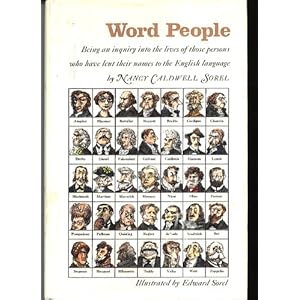I recently
stumbled over a book in our library called WORD PEOPLE, by Nancy Caldwell
Sorel. The first thing you are likely to
notice about the book is that the illustrations are by her husband, the great
cartoonist Edward Sorel.
It is a
book about eponyms, people whose names became words. I was intrigued by how many of them are
related to crime. Some of them will
probably be familiar to you, others not, so try to guess them before you read
the definition. I’ll start with the
easiest.
Joseph
Guillotin – He did not invent the world’s fastest haircut machine; he merely
popularized it in France just as a whole lot of people were about to get de-lifed.. Dr Guillotin
noted that noblemen were executed by sword, while peasants were hung, and
suggested that it would be both more egalitarian and more merciful if all convicted
criminals were decapitated. The first guillotine was a bargain at 300 francs, plus another 20 for a bag to catch the head..
Henry
Deringer – Inventer of the banjo. Just
kidding. His small gun was so popular
that fakes were made in lifetime, including French guns called Derringer, a
name that seems to have stuck better than his own.
Captain
Charles C. Boycott – Agent for English landlords in Ireland. Irish leader Charles Parnell said of such
people “leave him strictly alone!” People
refused to work for Boycott, or even sell him food. He and his family had to flee. Interestingly enough, years after the reform
laws the Irish had demanded were passed, Boycott returned to Dublin on a visit,
where he was recognized and cheered.
People wanted him to know it had been nothing personal.
Colonel
William Lynch. According to no less an
authority than Edgar Allan Poe, the colonel started a vigilante gang in
Pittsylvania, Virginia in 1780, thus giving rise to lynch law, and later to
the verb.
William
Burke – Irishman of Burke and Hare fame, They killed people in Edinburgh in order
to sell their bodies to a medical school for autopsies. To burke is to smother.
E.C.
Bentley – This mystery writer’s middle name was Clerihew, the handle he hung on a
form of poetry he created: a quatrain about a person, whose name is the first
line. For example:
E.C.
Bentley
To put it
gently
Earned no
disgrace
With
Trent’s Last Case
James
Granger - Never heard this one, but it
is fascinating. Granger was a British
clergyman with a rather horrible idea. His
Biographical History of England had no illustrations. Instead the reader was encouraged to buy
OTHER books and slice them up to illustrate your copy of his book. To grangerize means to mutilate one book in
order to create another, ie. I personally prefer Monsieur Guillotin’s
contribution.
And here’s
one that didn’t make Sorel’s book (possibly because the word is trademarked!) but which I use from time to time. I’ll bet Dale recognizes it, if no one else
does:
Frank
Shepard – in 1873 he invented Shepard’s Adhesive Annotations, which allowed
attorneys to slap changes or revisions to laws and court cases directly on the
page that contained them. Today lawyers
still shepardize cases by checking Shepard’s Citations or
competing services to see if legal opinions have been overruled or otherwise altered.
And here
are a few more from the book you might not have thought of as eponyms:
quisling, mesmerize, cardigan, derby, sideburn, silhouette, and dunce.

Rob. I'd read an article about these but you mentioned some that are new to me. My favorite is "burke."
ReplyDeleteAmusing and don't forget wellington as in boots
ReplyDeleteMy first thoughts were Gatling, Colt, Remington, S&W, etc, all the toys and hardware. Ponzi should be on the list.
ReplyDeleteMight be interested to know: Sir Robert Peel's last name is used as the shorthand for police in Ireland, where cops are sometimes called "Peelers". Found this out when reading Stuart Neville's excellent The Ghosts of Belfast in the hardboiled book club at the Poisoned Pen.
ReplyDelete--Dix
And some strange ones: Cardigan sweaters were named after James Brudenell, 7th Earl of Cardigan, who wore a knitted button-up sweater; he led the charge of the Light Brigade at Balaclava.
ReplyDeleteAnd balaclavas, robbers' favorite headgear next to stockings, is named after, again, the Crimean War, when these were supposedly sent to the troops in Balaclava to keep them warm.
You are so right, Deborah. Passion ignites passion. It's so vital for an artistic mind to be surrounded by others with the same verve for life and art even if it isn't in the same genre. Our "normal" life seems to be enraptured in the mundane and tediousness of the ordinary and that can make my writing in a word -boring. As always, thanks for sparking some passion!
ReplyDeleteI just remembered an episode of BLACKADDER in which Baldrick mentions that Gerald, the Earl of Sandwich, had had a casual lunch of meat between slices of bread.
ReplyDelete"That sounds good," said Blackadder. "Bring me a round of geralds."
Uncle of Patty Melt, right?
ReplyDelete